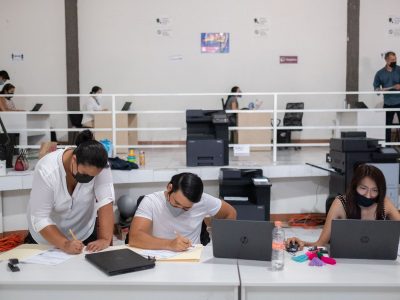Based on a presumption of inclusion and applying the broader definition, COMAR established a simplified and agile procedure.
Click here to access this practice on the global portal of ACSG

Implementation dates: July 2019 – present
General Description:
The Mexican Commission for Refugee Assistance (COMAR), the entity responsible for refugee status determination, implements procedures applying the broader definition proposed by the Cartagena Declaration to achieve a more flexible, efficient and high-quality procedure.
After a detailed analysis of the current situation in countries of origin, COMAR concluded that some of them present the necessary conditions to consider that there is a presumption of inclusion and thus grant them asylum under the expanded definition of a refugee from the Cartagena Declaration (provided for in Section II (and III) of Article 13 of the Law on Refugees, Complementary Protection and Political Asylum).
Based on the above situation, COMAR has established a presumption of inclusion for people fleeing their country due to circumstances that seriously disturb public order and involve mass violations of human rights. COMAR recognizes that these people are in need of international protection and could meet the eligibility criteria contained in the broader regional definition from the Cartagena Declaration (Section II of Article 13 of the aforementioned norm) following an analysis of the events in their countries of origin.
For this presumption of inclusion to apply, it is necessary that:
(i) The applicant is outside their country of origin and is of one of the eligible nationalities or, being stateless, these are their countries of habitual residence;
(ii) The person has fled for reasons connected to the situation of serious disturbance of law and order in their country of origin or does not wish to return for these reasons.
(iii) The person does not present any cause for exclusion;
(iv) The applicant’s account does not present any credibility problems.
Activities:
- A system to distribute cases among Protection Officers based on profiles was established: for example, unaccompanied or separated children are assigned to Protection Officers that specialize in children’s cases;
- For the implementation of this practice, a series of documents had to be prepared:
- Guide with questions related to an eventual exclusion analysis;
- Table with the structure of the interview;
- Resolution models;
- COI maintenance;
- Annex indicators;
Results / Impact:
- Since its implementation, these procedures have ensured that COMAR has achieved an increased level of efficiency for its decisions. In 2020, 12,677 persons were granted asylum in the country.
Implementation challenges:
- Initially, the implementation of this practice required a change in the mentality of the people involved in conducting interviews and analyzing cases, as this implied a different working method than the one they were used to.
Partner(s):
- COMAR / UNHCR (QAI Initiative)
Lessons learned:
- The procedure demonstrates the benefits of implementing case processing strategies to manage significant growth in asylum claims and, specifically the establishment of a presumption of inclusion based on the expanded definition from the Cartagena Declaration.
- Monitoring the implementation of procedures is essential for their effective application and for the achievement of the proposed objectives. This monitoring includes the establishment of concrete deadlines for the different stages and preparation of the necessary documents.
Impact of the COVID pandemic on implementation:
- The need to maintain social distancing measures forces the population to be attended to in accordance with biosecurity protocols, which has meant that the physical space available in COMAR’s offices insufficient. This has caused delays to the procedure.
Use of the Asylum Capacity Support Group mechanism:
No.
Additional information:
Website of the Mexican Commission for Aid to Refugees (COMAR)

